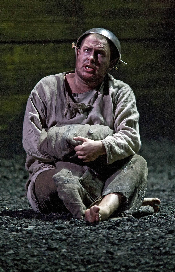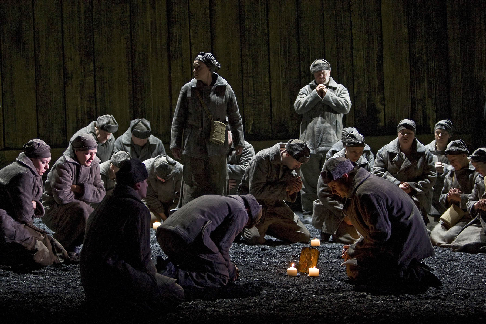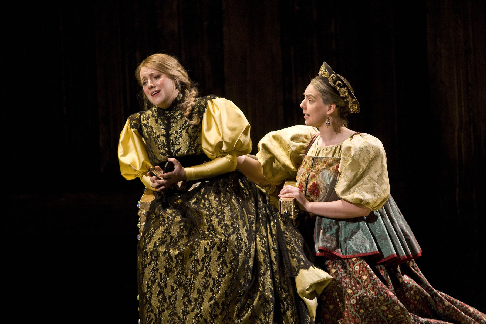![John Graham-Hall as Prince Vasily Shuisky and Peter Rose as Boris Godunov [Photo by Clive Barda]](http://www.operatoday.com/Boris_Godunov_011.png)
25 Nov 2008
Boris Godunov at ENO
There are two things which, in recent history, English National Opera has consistently done extremely well.
English Touring Opera are delighted to announce a season of lyric monodramas to tour nationally from October to December. The season features music for solo singer and piano by Argento, Britten, Tippett and Shostakovich with a bold and inventive approach to making opera during social distancing.
This tenth of ten Live from London concerts was in fact a recorded live performance from California. It was no less enjoyable for that, and it was also uplifting to learn that this wasn’t in fact the ‘last’ LfL event that we will be able to enjoy, courtesy of VOCES8 and their fellow vocal ensembles (more below …).
Ever since Wigmore Hall announced their superb series of autumn concerts, all streamed live and available free of charge, I’d been looking forward to this song recital by Ian Bostridge and Imogen Cooper.
The Sixteen continues its exploration of Henry Purcell’s Welcome Songs for Charles II. As with Robert King’s pioneering Purcell series begun over thirty years ago for Hyperion, Harry Christophers is recording two Welcome Songs per disc.
Although Stile Antico’s programme article for their Live from London recital introduced their selection from the many treasures of the English Renaissance in the context of the theological debates and upheavals of the Tudor and Elizabethan years, their performance was more evocative of private chamber music than of public liturgy.
In February this year, Albanian soprano Ermonela Jaho made a highly lauded debut recital at Wigmore Hall - a concert which both celebrated Opera Rara’s 50th anniversary and honoured the career of the Italian soprano Rosina Storchio (1872-1945), the star of verismo who created the title roles in Leoncavallo’s La bohème and Zazà, Mascagni’s Lodoletta and Puccini’s Madama Butterfly.
Evidently, face masks don’t stifle appreciative “Bravo!”s. And, reducing audience numbers doesn’t lower the volume of such acclamations. For, the audience at Wigmore Hall gave soprano Elizabeth Llewellyn and pianist Simon Lepper a greatly deserved warm reception and hearty response following this lunchtime recital of late-Romantic song.
Collapsology. Or, perhaps we should use the French word ‘Collapsologie’ because this is a transdisciplinary idea pretty much advocated by a series of French theorists - and apparently, mostly French theorists. It in essence focuses on the imminent collapse of modern society and all its layers - a series of escalating crises on a global scale: environmental, economic, geopolitical, governmental; the list is extensive.
For this week’s Live from London vocal recital we moved from the home of VOCES8, St Anne and St Agnes in the City of London, to Kings Place, where The Sixteen - who have been associate artists at the venue for some time - presented a programme of music and words bound together by the theme of ‘reflection’.
'Such is your divine Disposation that both you excellently understand, and royally entertaine the Exercise of Musicke.’
Amongst an avalanche of new Mahler recordings appearing at the moment (Das Lied von der Erde seems to be the most favoured, with three) this 1991 Mahler Second from the 2nd Kassel MahlerFest is one of the more interesting releases.
‘And there was war in heaven: Michael and his angels fought against the dragon; and the dragon fought and his angels, And prevailed not; neither was their place found any more in heaven … that old serpent … Satan, which deceiveth the whole world: he was cast out into the earth, and his angels were cast out with him.’
If there is one myth, it seems believed by some people today, that probably needs shattering it is that post-war recordings or performances of Wagner operas were always of exceptional quality. This 1949 Hamburg Tristan und Isolde is one of those recordings - though quite who is to blame for its many problems takes quite some unearthing.
There was never any doubt that the fifth of the twelve Met Stars Live in Concert broadcasts was going to be a palpably intense and vivid event, as well as a musically stunning and theatrically enervating experience.
‘Love’ was the theme for this Live from London performance by Apollo5. Given the complexity and diversity of that human emotion, and Apollo5’s reputation for versatility and diverse repertoire, ranging from Renaissance choral music to jazz, from contemporary classical works to popular song, it was no surprise that their programme spanned 500 years and several musical styles.
The Academy of St Martin in the Fields have titled their autumn series of eight concerts - which are taking place at 5pm and 7.30pm on two Saturdays each month at their home venue in Trafalgar Square, and being filmed for streaming the following Thursday - ‘re:connect’.
The London Symphony Orchestra opened their Autumn 2020 season with a homage to Oliver Knussen, who died at the age of 66 in July 2018. The programme traced a national musical lineage through the twentieth century, from Britten to Knussen, on to Mark-Anthony Turnage, and entwining the LSO and Rattle too.
With the Live from London digital vocal festival entering the second half of the series, the festival’s host, VOCES8, returned to their home at St Annes and St Agnes in the City of London to present a sequence of ‘Choral Dances’ - vocal music inspired by dance, embracing diverse genres from the Renaissance madrigal to swing jazz.
Just a few unison string wriggles from the opening of Mozart’s overture to Le nozze di Figaro are enough to make any opera-lover perch on the edge of their seat, in excited anticipation of the drama in music to come, so there could be no other curtain-raiser for this Gala Concert at the Royal Opera House, the latest instalment from ‘their House’ to ‘our houses’.
"Before the ending of the day, creator of all things, we pray that, with your accustomed mercy, you may watch over us."
![John Graham-Hall as Prince Vasily Shuisky and Peter Rose as Boris Godunov [Photo by Clive Barda]](http://www.operatoday.com/Boris_Godunov_011.png)
There are two things which, in recent history, English National Opera has consistently done extremely well.
One is Handel; the other, the large-scale Russian repertoire. It has been almost six years since the company last tackled the latter, but that revival of Khovanshchina left such an indelible impression that a new foray into this sector of the repertoire could not have been more eagerly awaited.
It is, to my mind, a shame that ENO chose to give Boris Godunov in its original seven-scene version of 1869. Running slightly over two hours, without an interval, it certainly has its merits in terms of dramatic tautness and momentum, but it is undeniably a weaker and poorer piece than the later versions. Most crucially, it lacks almost all the political and religious context of the later, longer version. The missing Polish act holds vital pieces of the jigsaw when it comes to Russia's history with Lithuania – it actually supplies the bedrock for the whole story. Without those scenes, all the focus is thrown onto Boris's private demons and the hardships of the Russian people. It is almost an entirely different opera.
 Simpleton (Robert Murray)
Simpleton (Robert Murray)
Tim Albery's new production follows through the idea of stripping the
piece bare. Tobias Hoheisel's set is simple and unusually austere; the entire
opera seems to take place in a giant wooden crate, perhaps a barn. Various
different rooms are created by platforms which slide in and out or come out
hinges. It's a drab brownish-grey, the colour of the peasants' costumes. When
colour is used, it is generally for effect; against this muted background,
the rich patterns of Boris's coronation robe are as garish as the clanging
bells up in the Balcony. Grigory's red hair instantly marks him out as a
figure of interest. The Innkeeper (Yvonne Howard) is vividly attired too, and
her mobile bar is a colourful affair – a welcome break for travellers
from the surrounding dreariness. Together with costume designer Brigitte
Reiffenstuel, Albery has done his best to make the action timeless by
combining costume designs from different periods. The peasants' attire is
generically 20th-century, while Boris's coronation seems to take place
centuries earlier; other costumes fall somewhere in between.
Peter Rose played Boris as a man whose occupation of the throne is as uneasy as he feared it would be. There was a warmth to his portrayal which made Boris likeable; the mad scene was never really gripping or hair-raising, but was full of pathos. Vocally, he held his own, with a sharper focus than I have heard in the past, though his expressive range is limited.
 Scene from Boris Godunov
Scene from Boris Godunov
The staging makes much of the Simpleton; curled up in one corner of the stage during the final scene, he witnesses Boris's breakdown and eventually leads the dying Tsar off into the beyond. Robert Murray's clear, lovely tenor was ideal, imbued with innocence and pathos.
The American tenor, Gregory Turay, was a handsome and secure-voiced Grigory, while John Graham-Hall was a wraith-like Shuisky, the pointed precision of his diction making him all the more sinister. Brindley Sherratt's Pimen was outstanding.
Although this version of the piece barely gives either of Boris's children an opportunity to make their mark, Sophie Bevan was an attractive and lyrical Xenia, and Anna Grevelius a confident Fyodor. (Xenia's second costume – the most striking of the whole production wardrobe – was worn for a ten-second dash across the stage, and again for the curtain call. What a waste!) Jonathan Veira was a characterful Varlaam.
 Xenia (Sophie Bevan) and Nurse (Deborah Davison)
Xenia (Sophie Bevan) and Nurse (Deborah Davison)
The opening scene did not show the (greatly augmented) chorus in their best light, with the ladies especially sounding shrill and vibrato-laden – but they rose to the challenge as the evening went on. The orchestra was magnificent under the baton of ENO's Music Director Edward Gardner, with muscular sound, sensitive phrasing, and particularly fine playing from the woodwind section. Now can we have the rest of the opera, please?
Ruth Elleson © 2008